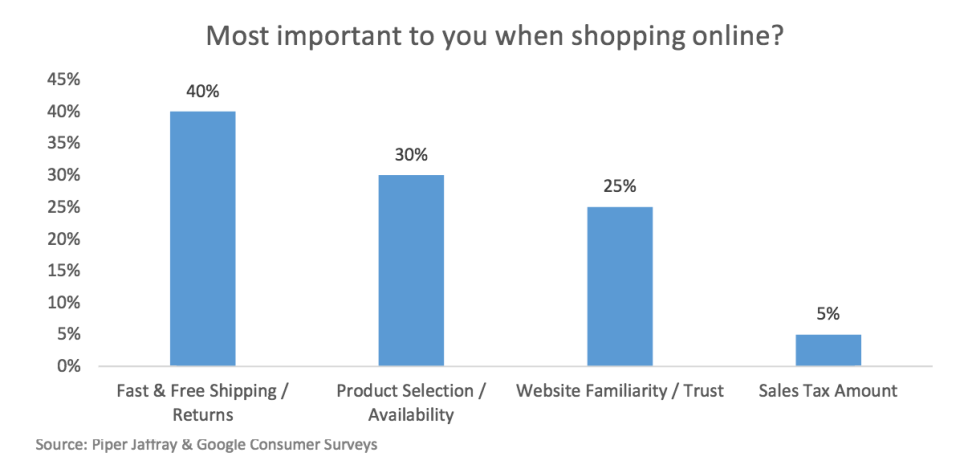Trump’s tax attack on Amazon is bad for small businesses
President Donald Trump says he is a champion of business, cutting taxes and implementing new rules that he claims benefit America’s businesses. But when it comes to his recent threats to Amazon, he may be doing the complete opposite: creating a costly nightmare for the third-party small businesses that operate on Amazon’s platform.
Amazon (AMZN) collects sales taxes for products it sells directly to consumers, while most third-party sellers on Amazon marketplace only collect taxes in the states that they have a physical presence in, as required by a 1992 U.S. Supreme Court ruling. Most third-party sellers are so small that they only have a brick-and-mortar facility in their hometowns.
On Thursday, Trump again accused Amazon of not paying enough sales tax. “They are not on an even playing field,” Trump told reporters on Air Force One, according to CNBC. “The playing field has to be level for everybody.” He added the sales tax situation would soon be looked at by the Supreme Court, “so we’ll see what happens.”
An attack on Amazon is an attack on mom-pop businesses
His comments come as more states express anger over “billions in lost revenue annually.” Amazon now shares sellers’ information with local taxing authorities under new state laws in Massachusetts and Rhode Island, raising fears among third-party sellers that the states will come after them for sales tax.
This month, the Supreme Court is scheduled to hear arguments from officials in South Dakota who contend the 1992 ruling is obsolete in the e-commerce era. If South Dakota wins, every online retailer will be required to collect sales tax regardless of where they have a physical presence. And that could be a nightmare for small businesses that sell products on Amazon.
“I think a lot of lawmakers don’t understand that they think they’re going after Amazon. Who they’re really hurting in the fallout is smaller online businesses like mom-pop businesses that really drive the economy,” Jennifer Dunn, chief of content at TaxJar, a sales tax compliance software for online businesses, told Yahoo Finance.
In fact, analysts at PiperJaffray say if the 1992 rule is overturned, it may end up doing Amazon a favor. If states collect taxes, third-party sellers on Amazon would have to increase product prices which may drive consumers to buy items that are sold directly by Amazon.
New sales tax rules could mean more revenue for Amazon
It is extremely difficult for third-party sellers to figure out tax codes and filing requirements, which vary by state and county. For a small business, it’s an overwhelming administrative hassle, so a lot of them just choose not to charge a sales tax.
“Not that they don’t want to, but there is just no good way to do it. The majority of sellers will collect the tax when it’s required and it’s easy to do it,” Eddie Levine, president of Wholesale Breakthrough, an Amazon seller, told Yahoo Finance.
Amazon provides third-party sellers with a tax calculation service, but charges 2.9% of all sales and use taxes and other transaction-based charges it calculates. According to sellers, the service hasn’t made things any easier, since they still need to go to great length to file tax returns in each state. If they fail to do so, the cost eats into their bottom lines.

“Amazon hasn’t been very helpful on this matter. It doesn’t offer sellers an easy way to report taxes,” said Levine, who sells millions a year on Amazon. “Amazon is not out there for sellers’ best interest. Amazon is out there for customers’ best interest.”
If third-party sellers are faced with a complex sales tax environment, they may use the Amazon tax calculation service, a high margin revenue stream for Amazon, according to PiperJaffray, which estimates retail third-party services will be $42 billion or 18% of all of Amazon’s revenue in 2018.
“States are owed billions of dollars every year from Amazon sellers. The sellers don’t collect the money. And Amazon doesn’t help very much at all,” said James Thomson, a partner at BuyBox Experts. “You may see a lot of sellers taking big financial hits this year.”
However, if what’s happening in the state of Washington an indication of what to expect, there may be hope for third-party sellers. This year, Washington became the first state to require online marketplaces to collect sales taxes on behalf of their third-party sellers. That state’s law said it is Amazon’s responsibility to collect, calculate and remit taxes for its third-party sellers. So, Amazon had to stop charging the 2.9% tax-calculation fee. Many small sellers in Washington were relieved and applauded the new rule.
Krystal Hu covers technology and economy for Yahoo Finance. Follow her on Twitter
Read more:
Apple CEO Tim Cook on Facebook data leak: Regulation is necessary
